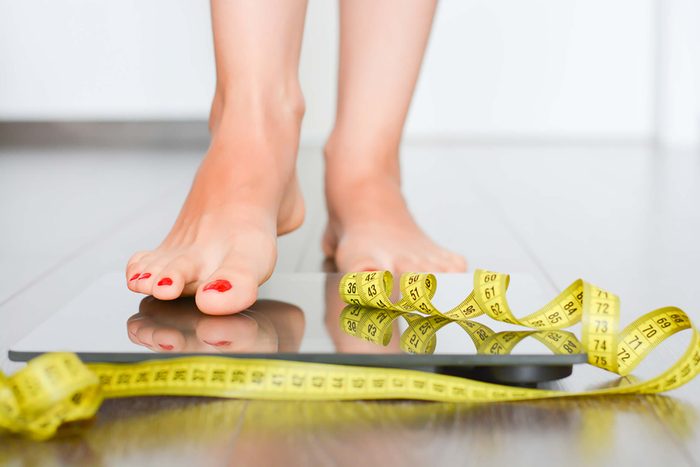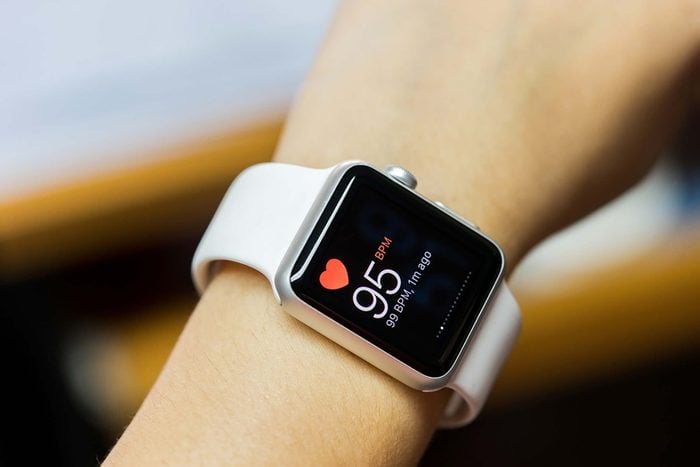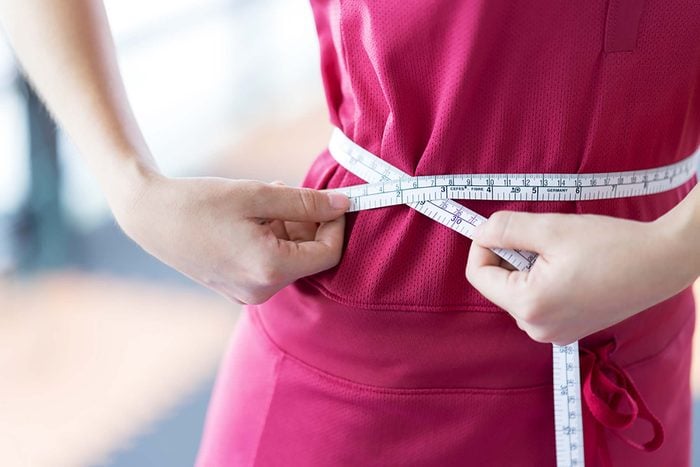
The definition of “healthy weight” is complicated
Over 40% of American adults are obese, according to the Centers for Disease Control and Prevention, so it’s no surprise that so many people are trying to slim down. But even if you’re not exactly where you’d like to be weight-wise, that doesn’t necessarily mean you need to lose weight. With so much pressure in our culture to always be the smallest we can be, many people might not realize that they are actually already at a healthy weight.
“With so much emphasis on weight loss these days, people are often trained to believe that no matter what their weight is, it isn’t good enough,” says Lori Zanini, RD, in Manhattan Beach, California. “This is unfortunate and causes unnecessary stress on individuals who may be perfectly healthy just the way they are.” There’s no one-size-fits-all formula to indicate how much you should weigh, and “healthy” can look different for each of us, and it can also evolve as we age, Zanini says. “It may not look like what you see in the movies or even in pictures of yourself from 10 years ago.”
So if the scale and social cues are unreliable, how can you tell when your body is happy—and healthy—right where it is? Consider if you can relate to these eight telltale signs.

You follow a healthy lifestyle
Despite the fact that you make healthy living a priority, you haven’t been able to lose weight. Frustrating? Sure. Make sure you’re not following a suboptimal eating plan, like diets that require you to cut out entire food groups. Another reason for your stasis could be that you’re already at a healthy weight. “I often see patients who are active and feel great but have a high body mass index (BMI) because of their muscle mass,” says Caroline Apovian, MD, the director of the Center for Nutrition and Weight Management at the Boston Medical Center. “Being healthy is more about having toned muscles and less about weight. Regularly lifting weights, doing cardio, and eating a healthy diet can help you feel great and will help your body reach whatever weight it ‘naturally’ wants to be to stay healthy.”
Eating This Can Reduce Your Risk of Early Death, Says New Study

You’re bursting with energy
If you can typically get through the day without downing four cups of coffee or endless caffeine-packed sodas, you’re probably at a healthy weight. “When you’re at your ideal weight, you feel healthy and energetic,” says Stephanie Middleberg, a New York City-based dietitian. While that may seem like an imprecise indicator, science echoes Middleberg’s point. According to a 2019 study in Obesity: The Journal of the Obesity Society, the total amount of energy spent on bodily functions decreases when you lose weight—so if you’re at a healthy weight, you’ll use less energy to go about your day and have higher energy levels overall.

You’re close to your goal and your weight is stable
If you’re in good health, are relatively close to your goal weight, and have been staring down at the same number on the scale for years, your body is probably happy right where it is—even if you think there’s room for “improvement.” “Your ideal weight should be a number that you can get to and maintain without heavy restriction,” says Middleberg. Tasneem Bhatia, MD, author of The Super Woman RX agrees, adding, “When you have a healthy body weight, your current weight should be fairly stable. You shouldn’t constantly be losing or climbing.”

Consider your resting heart rate
When most people think about maintaining a healthy body weight, things like fitting into a size 4 or 6 may come to mind. But it’s about so much more than your outward appearance. It’s about your overall health—including your resting heart rate, which is the number of times your heart beats per minute when you’re sitting still. While a lower resting heart rate is a sign that your heart is working efficiently, a high resting heart rate could be an early warning sign of a heart problem. “A healthy range is between 60 and 100 beats per minute with the lower the number indicating better physical fitness independent of weight,” Zanini explains. So long as you’re in a healthy range, you shouldn’t fuss too much about losing those last few “vanity pounds.”

You have a healthy waist circumference
If your middle is home to excess fat, you may be at a higher risk of heart disease, type 2 diabetes, and other chronic diseases, Zanini cautions. “A healthy waist circumference for men is less than 40 inches, and women should aim for less than 35 inches.” Not sure how you measure up? Wrap a measuring tape just under your belly button to get an accurate reading. If you fall beneath the upper limit, there’s probably no need to fuss about losing weight for optimal health.

Trying to lose weight would make you miserable
Dieting can actually cause emotional harm: Certain dietary restrictions can double your risk of depression. So take a minute and analyze your efforts. If you’ve been consistently working out and eating right and the scale just isn’t budging, this could be a sign that your weight is right where it should be and your body doesn’t want you to lose anymore, says personal trainer and registered dietitian, Jim White. (It could also be a sign you’re gaining muscle and losing fat, which is also a good thing.)
“This is especially true if you feel like you really couldn’t eat any better or exercise any longer or harder without negative impacts on your life,” he says. No one wants to spend four hours a day at the gym or totally give up all their favorite foods, and frankly, if your body is happy where it is, it’s probably not worth the trouble.
“Everyone has what’s called a weight set-point. This is the weight that your body naturally desires to be without relying on excessive exercise or strict dieting,” Zanini explains.
“Individuals who try to fall below a certain weight by severe calorie restriction or intense exercise yet have minimal success in achieving the lower number on the scale may be trying too hard to go below their body’s natural set-point. This causes their body to fight back and can prevent them from losing those last few pounds.” says Zanini. “Knowing if you’re at your body’s set-point can be a bit challenging, but typically it involves a weight that is easy for you to maintain over long periods of time and doesn’t involve severe food cravings or hunger swings.”
People Who Did This One Thing at Age 50 Were the Healthiest at Age 80

Your body is already on the lean side
Your percentage of body fat is a good indication of how fit you are. Believe it or not, people who are not overweight can be overfat—their body fat percentage puts them in danger even though their weight is in the lower range. And the reverse is true—some people can look heavy even though their body-fat percentage is healthy.
Instead of relying on a scale, BMI, or a weight chart to determine if your size is where it should be, consider having your body fat analyzed, suggests Christine M. Palumbo, RDN, in Naperville, Illinois.
“Companies may offer annual biometric body testing for health insurance purposes, and many health clubs also offer the service. If your body fat percentage is normal for your gender and age, you’re probably in a good place weight-wise.” According to the American Council on Exercise, a healthy range for women is between 14 to 31%, and a healthy percentage for men is 6 to 24%.

You’re happy with how you look
Forget BMI and those outdated healthy weight charts; they just aren’t accurate, says Isabel Smith, RD, CDN, a New York City-based celebrity dietitian. “BMI is tricky because it doesn’t account for fat versus muscle. Healthy weight charts and calculators can be helpful tools, but they’re not the be-all-end-all, and there are certainly other factors to be considered.”
Starting with your happiness: Smith says your ideal weight should be a place where you feel happy and are healthy. “By focusing on adopting healthy, positive behaviors, you’ll start to feel better about your body—and you’ll likely improve your overall health and body composition, too.”